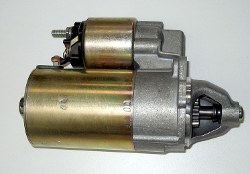Cars and Information Technology

All great stuff, but computer security can be really complicated, so I hope car manufacturers' software engineering is more rigorous than that often found in the home computing sphere.
It's fine if all these systems are separate from each other, but convenience, interoperability and efficiency suggests that all of these systems will get knitted together into one in-car IT system. Once this happens, a vulnerability in one system could open the doors to exploitation of all the other systems. For example, a music CD burned with some encoded malware might be able to instruct the engine's fuel injection system to shut down, disabling the engine. In my opinion, engineering and diagnostic functions should never be accessible via a method that could be potentially invisible to the car owner. The possibilities for a car equipped with mobile internet connectivity could be horrifyingly endless.
I like in-car gadgets, but I hope the car industry has learned from the mistakes of other sectors and are keeping their various systems completely separate, or at least keeping the security and engine management systems apart from everything but immobilisers and diagnostics.
I'll be surprised and impressed if we don't hear of cars being hacked within the next few years.
From the standpoint of someone who makes some effort to keep up with the very fast-moving world of IT (sometimes needlessly fast, in my opinion), car manufacturers often seem very slow to innovate. Maybe this is as a result of being cautious of new technologies and extensive testing and engineering.
Progress is generally a good thing. Few people today would want a car that had to be started with a crank handle because it lacked a starter motor. Similarly, most people would not want to be without an engine management computer, as the computer can generally adjust the fuel/air mixture better than a human operating a manual choke, and manage a number of other engine parameters better than the old mechanical methods that were used.
These relatively simple technologies now usually work so well that we don't even think about them. But that wasn't always the case.
When engine management computers first started to be widely introduced in the eighties, they often proved quite unreliable after a few years in operation. I had my old Austin-Rover Maestro converted to a manual choke to work around starting problems. I eventually figured out that the problem was the Engine Control Unit. I recall making more than one trip to breakers yards to pick up a cheap control unit after the temperature gauge went crazy yet again.
In some old cars, even the humble starter motor used to be prone to sticking - the car had to be put in gear and rocked back and forth to free it.
I'm one of those people who would quite like to keep the manual options as backups to the automatic ones. If a starter fails, it would be nice to be able to crank the engine manually (though this would be difficult with large engines). If the engine computer suddenly decides that the fuel mixture is too rich - regardless of evidence to the contrary - it would be useful to have an override.
Sadly, such features are almost certainly more expensive compared to an automatic-only solution, and probably very few people would appreciate them.
But consider another automatic driving aid - automatic gearboxes versus manual transmission.
Compared to the USA, the UK is notable for having a higher proportion of manual transmission cars and drivers. Yet, automatic transmission is easier to use and as the technology advances it may reach a point where the car computer can change gears better and faster than a human (some might argue this is already the case in some cars, but this doesn't take account of the fact that it can be useful to change down on approach to certain situations if driving quickly, something automatic transmissions can't currently predict or do).
But you don't have to be a Jeremy Clarkson clone to appreciate the additional control that manual transmission delivers.
Without manual gear change, you can't free a stuck starter motor by putting the car in gear and rocking it. If your handbrake fails, you can't work around the problem by putting the car in gear and letting the engine act as a brake (put the car in a gear opposite to the direction that it would travel if gravity had its way e.g. select reverse if the car would fall forward, 1st gear otherwise). If the battery's flat or the engine is stubborn to start, you can't fix it by putting the car in gear and pushing it, or towing it, and then letting out the clutch to spool up the engine.
Automatic systems are great when they work well. But in cars, as with IT, it's useful to have the less convenient manual options available for when it all goes wrong, or to give a little more power and flexibility to people who know what they're doing.
Image credit




